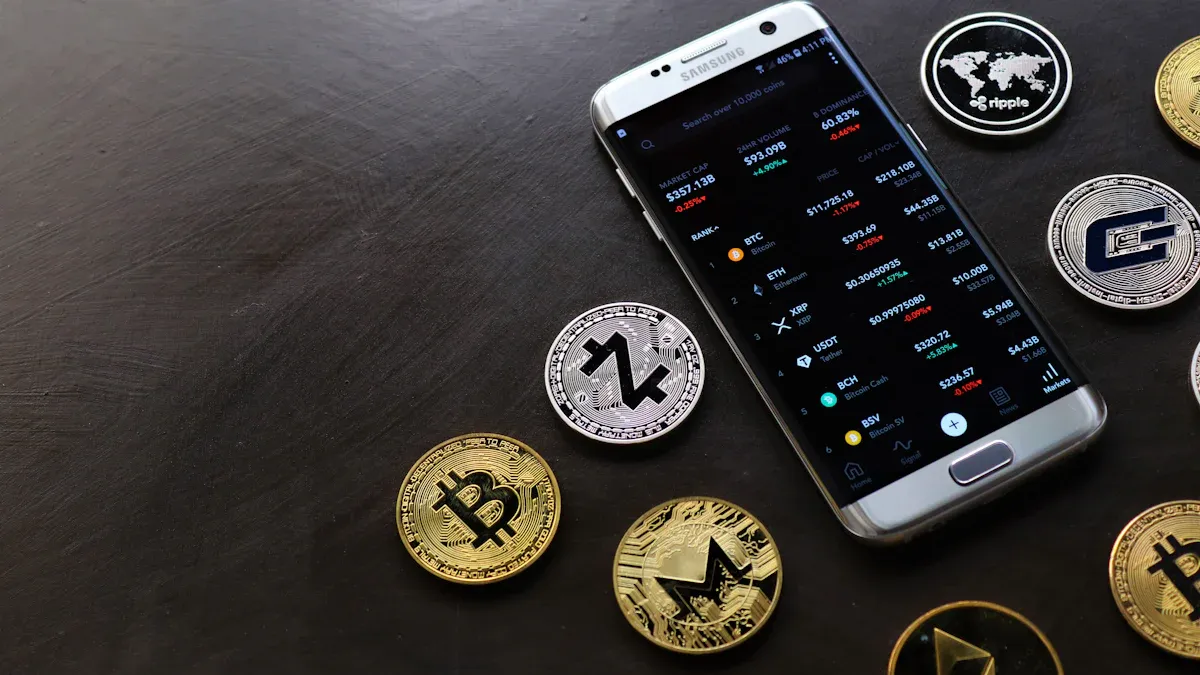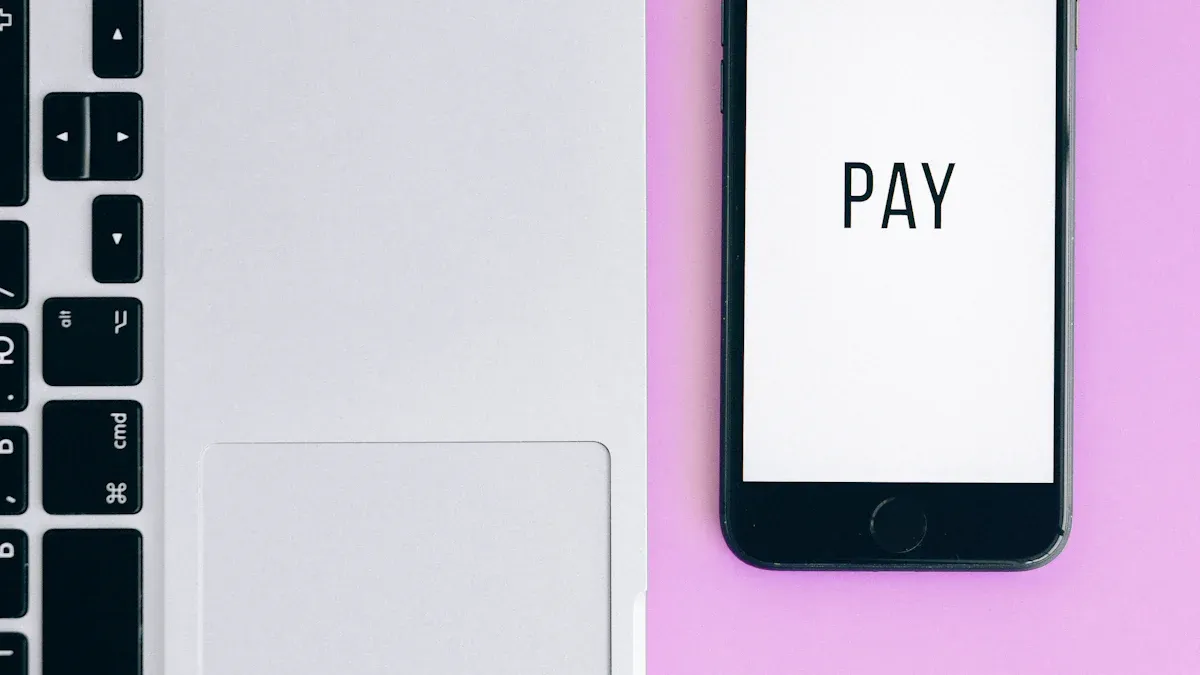- EasyCard
- Trade
- Help
- Announcement
- Academy
- SWIFT Code
- Iban Number
- Referral
- Customer Service
- Blog
- Creator
Untraceable Money Transfer Apps: The Best Choice for Privacy Protection and Secure Remittances

Image Source: pexels
When choosing a fund transfer app, privacy protection, anonymity, and security are crucial. Apps like Monero, Zcash, and Wasabi Wallet have gained attention for their excellent anonymity technologies. Many users have the following primary concerns when making cross-border remittances and protecting personal information:
- 59% of people worry about cross-border remittance fraud, and 90% want strict security measures.
- 75% of Gen Z users stop payments due to fraud concerns.
- Collecting identity information raises serious privacy concerns, especially for migrant workers and underserved communities, who face higher risks of identity fraud.
Key Takeaways
- Privacy protection and security are the top considerations when choosing a fund transfer app.
- Using untraceable apps can effectively prevent identity theft and unauthorized use of funds.
- Monero, Zcash, and Wasabi Wallet are three privacy-focused apps worth noting, each with unique privacy mechanisms.
- Ensure the app complies with data protection laws to avoid legal risks due to non-compliance.
- Regularly review account activity and enable two-factor authentication to enhance account security.
Definition and Importance

Image Source: pexels
Untraceable Fund Transfer Apps
You can think of untraceable fund transfer apps as digital tools focused on protecting user privacy and anonymity. These apps typically use advanced encryption technologies to ensure that every transaction cannot be tracked by third parties. When using these apps, you don’t need to disclose real identity information, and the system automatically hides the source and destination of your transactions. Many apps also support direct bank transfers without intermediaries, improving the efficiency and security of fund transfers. You can choose from multiple payment methods to meet the needs of different scenarios.
The Importance of Privacy Protection
In the era of digital finance, data privacy has become a core issue that everyone must pay attention to. When using fund transfer apps, protecting personal information not only prevents identity theft but also avoids unauthorized use of funds. Data privacy is not just about preventing data leaks; more importantly, it gives you control over your information. You can decide what information is collected, how it is used, and whether it is shared. Understanding data privacy issues is the first step in promoting policy and regulatory reforms that balance your rights with the obligations of service providers.
- Data privacy has become a central issue in the financial market.
- Data protection focuses on the availability and security of data, while data privacy emphasizes personal control over information.
Differences from Traditional Transfer Methods
When choosing untraceable fund transfer apps, you’ll notice significant differences from traditional transfer methods. Traditional methods usually require you to provide detailed identity information, and the transaction process is easily recorded by banks or third-party institutions. Untraceable apps emphasize anonymity and security, using encryption technologies to protect your funds and information. You don’t need to rely on intermediaries, and funds can be transferred directly, reducing the risk of theft or leaks. Compared to traditional methods, these apps offer higher privacy protection and flexibility.
- Enhanced security and anonymity
- Direct bank transfers without intermediaries
- Multiple payment options
- Advanced encryption technologies ensure confidentiality
Mainstream Fund Transfer Apps

Image Source: pexels
When choosing fund transfer apps, Monero, Zcash, and Wasabi Wallet are currently the most notable products. Each uses different privacy protection technologies to help you safeguard personal information and funds during transfers. Below, I’ll explain the core mechanisms and performance of each app in detail.
Monero Privacy Mechanisms
Monero is renowned for its high level of anonymity. When you use Monero, the system automatically generates a one-time destination key for each transaction, combining it with the recipient’s public key and other cryptographic primitives to ensure privacy during the transaction process. Monero employs multiple encryption technologies to protect your identity and fund flows:
- Using ring signature technology, it mixes multiple users’ transactions together, making it difficult for external observers to identify the specific sender.
- Ring Confidential Transactions (RingCT) hide the amount of each transaction, visible only to you and the recipient.
- Stealth address mechanisms generate a new address for each transfer, further obscuring the source and destination of funds.
- You can initiate transactions through Tor or I2P networks to hide your IP address, reducing the risk of identity exposure.
- The Dandelion++ protocol further protects node-related information, minimizing the possibility of sensitive data leaks.
These mechanisms make Monero a top choice for many users, especially in scenarios requiring extremely high privacy protection.
Zcash Anonymity Technology
Zcash uses zero-knowledge proof technology, specifically zk-SNARKs, to provide flexible privacy protection. When using Zcash, you can choose between transparent or shielded transactions. In shielded transactions, the system does not disclose the transaction amount, sender, or recipient information. Zcash’s core privacy mechanisms include:
- Using zk-SNARKs, it allows you to prove you have sufficient funds for a transfer without revealing the specific amount or identity.
- You can complete fund transfers while keeping all transaction details confidential.
- Shielded and transparent transactions can be switched freely to meet your needs in different scenarios.
Zcash offers greater flexibility. If you want to disclose information in some scenarios and protect privacy in others, Zcash is a worthy option.
Wasabi Wallet Coin Mixing Function
Wasabi Wallet is designed specifically for Bitcoin users, focusing on its coin mixing function. When using Wasabi Wallet, you can mix multiple transactions together through the CoinJoin protocol, breaking the direct link between the source and destination of funds. Its main privacy mechanisms include:
- The CoinJoin protocol requires multiple users to jointly sign a transaction, mixing their Bitcoin to enhance anonymity.
- Integrated Tor network hides your IP address, protecting identity information.
- The coin mixing process minimizes trust, making it difficult for external observers to track the specific flow of each fund.
While no method can achieve 100% anonymity, Wasabi Wallet’s coin mixing strategy is highly effective in practice, making it suitable for users seeking higher privacy protection in the Bitcoin network.
Comparison of App Pros and Cons
When choosing a fund transfer app, you can refer to the table below to understand the performance of the three mainstream apps in terms of privacy and security:
| Wallet | Privacy Features | Security Features |
|---|---|---|
| Monero | Default privacy, using ring signatures, stealth addresses, and confidential transactions | Designed to make it nearly impossible to link transactions to specific users |
| Zcash | Optional privacy, using zero-knowledge proofs (zk-SNARKs) | Users can choose transparent or shielded transactions, offering high flexibility |
| Wasabi | Uses CoinJoin for transaction mixing | Provides built-in features to enhance anonymity, suitable for privacy-conscious users |
You can see that Monero is ideal for scenarios where privacy is a top priority, Zcash offers flexible privacy options, and Wasabi Wallet focuses on anonymous Bitcoin transfers. Each app has unique strengths in the fund transfer app space, allowing you to choose based on your specific needs.
Selection Criteria
Encryption and Anonymity
When choosing a fund transfer app, you should first focus on encryption technologies and anonymity. Different apps use various methods to protect your identity. For example, anonymous privilege systems provide an open framework for remote transactions, ensuring identity anonymity. You can refer to the table below to understand common anonymity implementation methods:
| Implementation Method | Description |
|---|---|
| Anonymous Privilege System | Provides an open and universal framework to ensure user identity anonymity in remote transactions. |
| Requirement Set | Requirements that the implementation must meet to ensure a fully anonymous privilege system. |
| Application Scenarios | Demonstrates the possibilities of services provided by the framework, emphasizing the importance of protecting user sensitive information. |
You should prioritize apps that use end-to-end encryption and multiple anonymity mechanisms to effectively prevent tracking of your identity and fund flows.
Compliance and Security
When using privacy-focused transfer tools, compliance is equally important. Many countries and regions have strict data protection requirements. For example, GDPR allows users to request data deletion at any time, and CCPA requires platforms to provide opt-out options and disclosure policies. You need to ensure the app complies with the following laws:
| Law | Compliance Requirements |
|---|---|
| GDPR | Users have the right to request data deletion at any time and must be clearly informed about data usage. |
| CCPA | Grants consumers rights over personal data, requiring clear opt-out options and strict disclosure policies. |
| HIPAA | Regulates the use and sharing of medical information, requiring encryption and patient consent. |
| PIPEDA | Emphasizes transparency in data use and user access rights. |
You should choose apps that meet compliance requirements in mainland China and international markets to avoid legal risks due to non-compliance.
User Experience
When experiencing fund transfer apps, the operation process should be simple and clear. You can prioritize products with user-friendly interfaces, multi-language support, and fast transfer speeds. You should also check if the app supports notification functions and two-factor authentication, which can help you stay informed about account activities and enhance security.
Fund Security
When ensuring fund security, you need to focus on the app’s encryption and authentication measures. Many platforms use blockchain, peer-to-peer transfers, and strong encryption technologies to ensure that only you and the recipient can view the transaction. You should enable two-factor authentication and check if the website has an HTTPS encryption marker. You also need to carefully verify recipient information to avoid losses due to operational errors. Only by choosing reputable and technologically advanced apps can you maximize the security of your funds.
Usage Recommendations
Setup and Operation
When using a fund transfer app for the first time, you need to follow secure setup procedures. You should enable user authentication to ensure only you can access the account. You can set access controls for the account to limit permissions for different operations. You should also encrypt stored files to prevent data theft. Many apps support PGP encryption, ensuring that even if data is intercepted during transmission, the content remains secure. When transferring files, it’s recommended to use encrypted channels to ensure information flows only between you and the recipient. A secure setup process can effectively reduce the risk of account attacks.
Risk Prevention
In daily operations, you should stay vigilant against various tactics used by cybercriminals. For example, some may use phishing or impersonation to trick you into authorizing fraudulent payments. You need to be aware of these common fraud tactics to avoid falling victim. You should also pay attention to account authentication and regularly change passwords to prevent hacker intrusions. You should verify every transaction to ensure recipient information is accurate. You should also avoid operating in insecure network environments. You can enable transaction notification functions to detect unusual activities immediately. Only by adopting good operational habits can you effectively prevent risks.
Information Protection
When protecting personal information, you can take multiple measures. You should enable multi-factor authentication to add an extra layer of security to your account. You should use strong encryption technologies to convert data into ciphertext that only authorized users can read. You can adopt role-based access controls to limit the scope of sensitive data access. You should also conduct regular security audits to identify potential vulnerabilities promptly. You can establish data transfer policies to standardize the process for each file transfer. You should also monitor security risks from third-party collaborations to ensure data isn’t leaked due to external partnerships. Before each operation, carefully verify the recipient and amount to avoid losses due to errors. You can also set a PIN or fingerprint verification for the app to further enhance security.
When choosing untraceable fund transfer apps, you should focus on key elements such as encryption, authentication, compliance, and user management. The table below shows the different privacy and security features of mainstream apps:
| App | Privacy Features Description | Security Description |
|---|---|---|
| Cash App | Supports anonymous transactions | Transaction limits tied to identity verification |
| Venmo | Allows privacy restrictions | Account limits increase with verification |
| PayPal Business | Hides personal identity | High payment limits, requires identity verification |
| Google Pay | Uses tokenization and biometric authentication | Supports NFC for secure transactions |
You should regularly review account activity, enable two-factor authentication, and update passwords promptly. Staying informed about privacy and security trends can help you better protect your funds and personal information.
FAQ
What Are Untraceable Fund Transfer Apps?
You can understand them as apps that use encryption and anonymity technologies to protect your identity and transaction information, preventing third parties from tracking each transfer.
Do These Apps Require Additional Fees?
When using them, some apps may charge service fees or network transaction fees. Fees are typically quoted in USD, and it’s recommended to review the fee details before transferring.
Are These Apps Legal in Mainland China?
You need to pay attention to relevant laws and regulations in mainland China. Some apps may be restricted. You should choose and use them under legal and compliant conditions.
How Can I Ensure My Account Security?
You can enable two-factor authentication and regularly change passwords. You should also avoid operating in public network environments to prevent account information leaks.
What Should I Do If a Transfer Fails or Funds Are Lost?
You should promptly contact the app’s customer service or platform support. You can keep transaction records as evidence for subsequent communication and claims.
When delving into untraceable money transfer apps, you might be troubled by transaction tracking risks, identity exposure threats, and hefty intermediary fees—issues that heighten fraud vulnerabilities in cross-border remittances, particularly for Gen Z and migrant users. Envision a platform with a total fee as low as 0.5% , real-time rate inquiries, anonymous swaps between 30+ fiat currencies and 200+ digital assets, worldwide reach, and same-day delivery. How would that bolster your privacy shield?
BiyaPay is engineered for anonymity-conscious users. As a cutting-edge digital finance tool, we employ multi-layer encryption and compliance protocols to keep transaction details visible only to you and the recipient, thwarting third-party scrutiny. With a swift mobile signup, initiate seamless exchanges and transfers, leveraging real-time exchange rates to capture top rates sans hidden surcharges. BiyaPay integrates two-factor authentication and end-to-end encryption, aligning with GDPR and global norms for discreet, dependable fund flows.
Don’t let privacy fears curb your financial autonomy! Dive into BiyaPay now to scan real-time rates and launch secure transfers. Sign up for a BiyaPay account today and embrace low-fee, instant, privacy-first remittances that safeguard your digital trail.
*This article is provided for general information purposes and does not constitute legal, tax or other professional advice from BiyaPay or its subsidiaries and its affiliates, and it is not intended as a substitute for obtaining advice from a financial advisor or any other professional.
We make no representations, warranties or warranties, express or implied, as to the accuracy, completeness or timeliness of the contents of this publication.




Contact Us
Company and Team
BiyaPay Products
Customer Services
is a broker-dealer registered with the U.S. Securities and Exchange Commission (SEC) (No.: 802-127417), member of the Financial Industry Regulatory Authority (FINRA) (CRD: 325027), member of the Securities Investor Protection Corporation (SIPC), and regulated by FINRA and SEC.
registered with the US Financial Crimes Enforcement Network (FinCEN), as a Money Services Business (MSB), registration number: 31000218637349, and regulated by FinCEN.
registered as Financial Service Provider (FSP number: FSP1007221) in New Zealand, and is a member of the Financial Dispute Resolution Scheme, a New Zealand independent dispute resolution service provider.


















